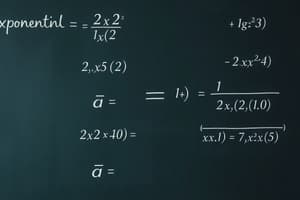Podcast
Questions and Answers
What is the general form of an exponential function?
What is the general form of an exponential function?
- f(x) = x^b
- f(x) = b + x
- f(x) = b * x
- f(x) = b^x (correct)
What condition must be satisfied for the base b in an exponential function?
What condition must be satisfied for the base b in an exponential function?
- b > 0 and b ≠ 1 (correct)
- b > 0 and b = 1
- b = 0 and b ≠ 1
- b < 0 and b ≠ 1
What happens when the base b in an exponential function is greater than 1?
What happens when the base b in an exponential function is greater than 1?
- The function exhibits exponential decay.
- The function exhibits exponential growth. (correct)
- The function oscillates.
- The function remains constant.
What is the y-intercept of the graph of an exponential function f(x) = b^x?
What is the y-intercept of the graph of an exponential function f(x) = b^x?
What is the domain of an exponential function?
What is the domain of an exponential function?
What is the range of an exponential function?
What is the range of an exponential function?
What is the horizontal asymptote of an exponential function?
What is the horizontal asymptote of an exponential function?
What is the general form of a logarithmic function?
What is the general form of a logarithmic function?
What condition must be satisfied for the base b in a logarithmic function?
What condition must be satisfied for the base b in a logarithmic function?
If f(x) = log_b(x), what is the value of f(b)?
If f(x) = log_b(x), what is the value of f(b)?
What is the inverse operation of the logarithm function?
What is the inverse operation of the logarithm function?
What is the domain of the logarithm function?
What is the domain of the logarithm function?
What is the range of the logarithm function?
What is the range of the logarithm function?
What is the intercept of the logarithm function?
What is the intercept of the logarithm function?
What is the asymptotic behavior of the logarithm function?
What is the asymptotic behavior of the logarithm function?
What is the rule for multiplying two numbers using logarithms?
What is the rule for multiplying two numbers using logarithms?
What is the rule for dividing one number by another using logarithms?
What is the rule for dividing one number by another using logarithms?
What is the rule for exponentiation using logarithms?
What is the rule for exponentiation using logarithms?
What is the formula used to convert the base of a logarithm?
What is the formula used to convert the base of a logarithm?
Which of the following statements about solving exponential equations is true?
Which of the following statements about solving exponential equations is true?
What is the main difference between exponential growth and exponential decay?
What is the main difference between exponential growth and exponential decay?
What is the range of the logarithmic function $y = \log_b(x)$?
What is the range of the logarithmic function $y = \log_b(x)$?
What is the value of $\log_b(b)$?
What is the value of $\log_b(b)$?
Which of the following statements about the domain of an exponential function $f(x) = b^x$ is correct?
Which of the following statements about the domain of an exponential function $f(x) = b^x$ is correct?
What is the rule for converting the base of a logarithm from b to a?
What is the rule for converting the base of a logarithm from b to a?
What is the horizontal asymptote of the exponential function $f(x) = b^x$?
What is the horizontal asymptote of the exponential function $f(x) = b^x$?
Which of the following statements about the y-intercept of the graph of the exponential function $f(x) = b^x$ is correct?
Which of the following statements about the y-intercept of the graph of the exponential function $f(x) = b^x$ is correct?
What is the inverse operation of the logarithm function?
What is the inverse operation of the logarithm function?
What is the rule for exponentiation using logarithms?
What is the rule for exponentiation using logarithms?
What happens when the base b in an exponential function $f(x) = b^x$ is greater than 1?
What happens when the base b in an exponential function $f(x) = b^x$ is greater than 1?
If $\log_2(x) = 5$, what is the value of $x$?
If $\log_2(x) = 5$, what is the value of $x$?
Given $\log_3(x) + \log_3(y) = 2$, what is the value of $\log_3(xy)$?
Given $\log_3(x) + \log_3(y) = 2$, what is the value of $\log_3(xy)$?
If $\log_5(x) = 2$ and $\log_5(y) = -1$, what is the value of $\log_5\left(\frac{x}{y}\right)$?
If $\log_5(x) = 2$ and $\log_5(y) = -1$, what is the value of $\log_5\left(\frac{x}{y}\right)$?
If $\log_2(x) = 3$, what is the value of $\log_4(x)$?
If $\log_2(x) = 3$, what is the value of $\log_4(x)$?
If $\log_2(x) = 4$, what is the value of $\log_2(x^3)$?
If $\log_2(x) = 4$, what is the value of $\log_2(x^3)$?
If $f(x) = \log_2(x)$, what is the value of $f(16)$?
If $f(x) = \log_2(x)$, what is the value of $f(16)$?
If $\log_3(x) = 2$ and $\log_3(y) = 4$, what is the value of $\log_3\left(\frac{x^2}{y}\right)$?
If $\log_3(x) = 2$ and $\log_3(y) = 4$, what is the value of $\log_3\left(\frac{x^2}{y}\right)$?
If $\log_2(x) = 3$ and $\log_4(y) = 2$, what is the value of $\log_8(xy)$?
If $\log_2(x) = 3$ and $\log_4(y) = 2$, what is the value of $\log_8(xy)$?
If $\log_5(x) = 2$ and $\log_5(y) = -1$, what is the value of $\log_5\left(\frac{x^2}{y^3}\right)$?
If $\log_5(x) = 2$ and $\log_5(y) = -1$, what is the value of $\log_5\left(\frac{x^2}{y^3}\right)$?
If $\log_3(x) = 2$ and $\log_3(y) = -1$, what is the value of $\log_9\left(\frac{x^2}{y}\right)$?
If $\log_3(x) = 2$ and $\log_3(y) = -1$, what is the value of $\log_9\left(\frac{x^2}{y}\right)$?




